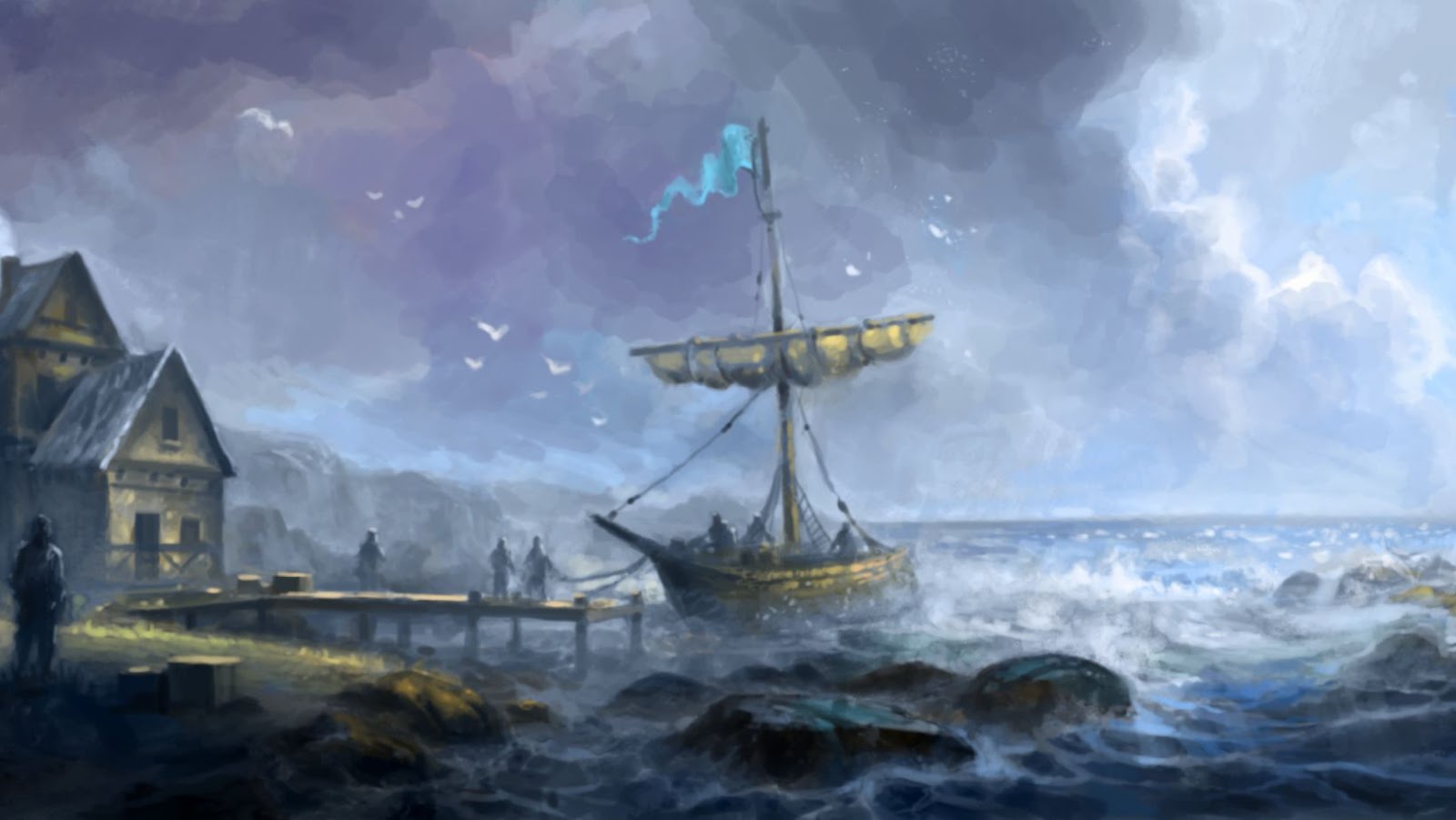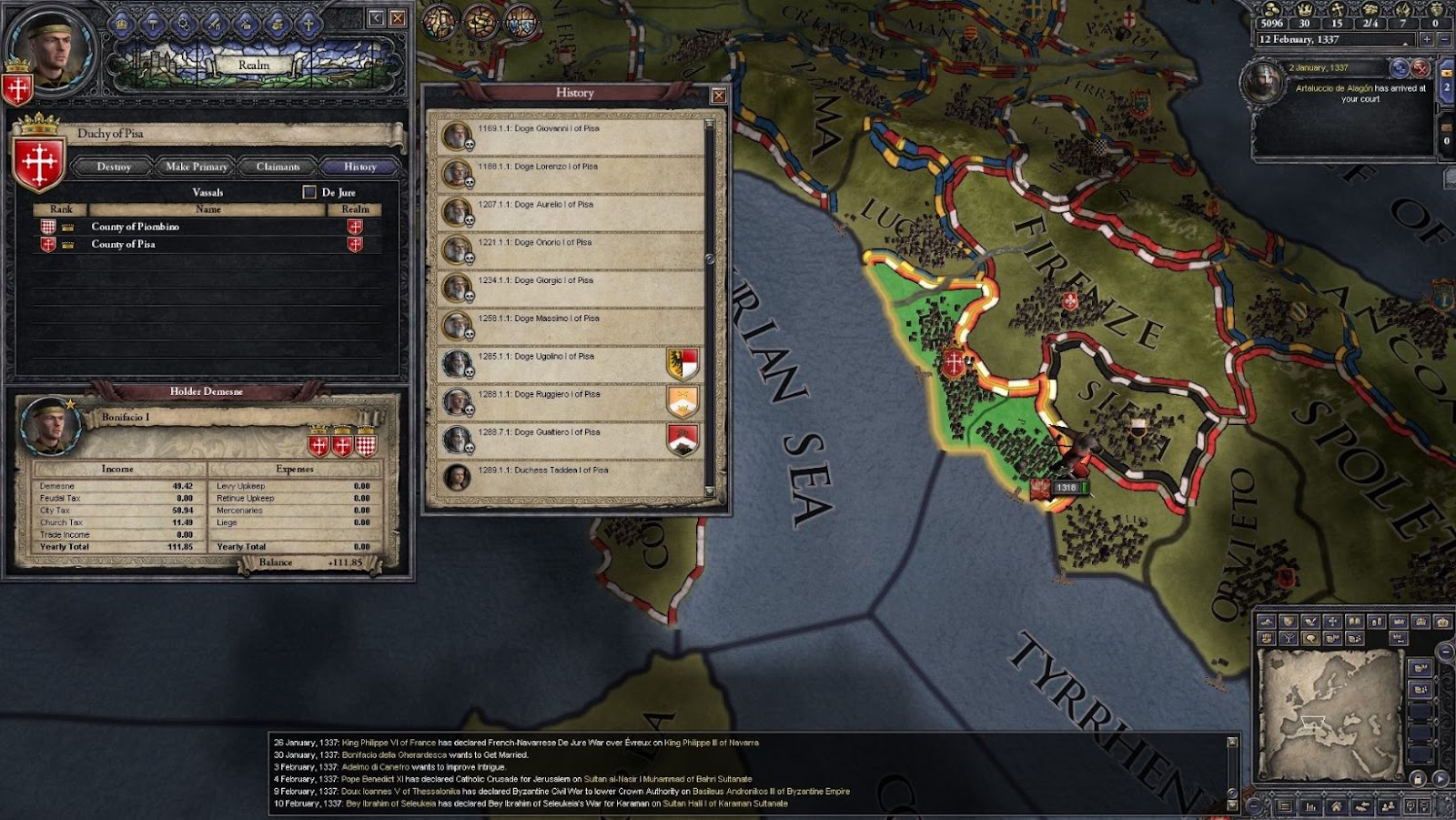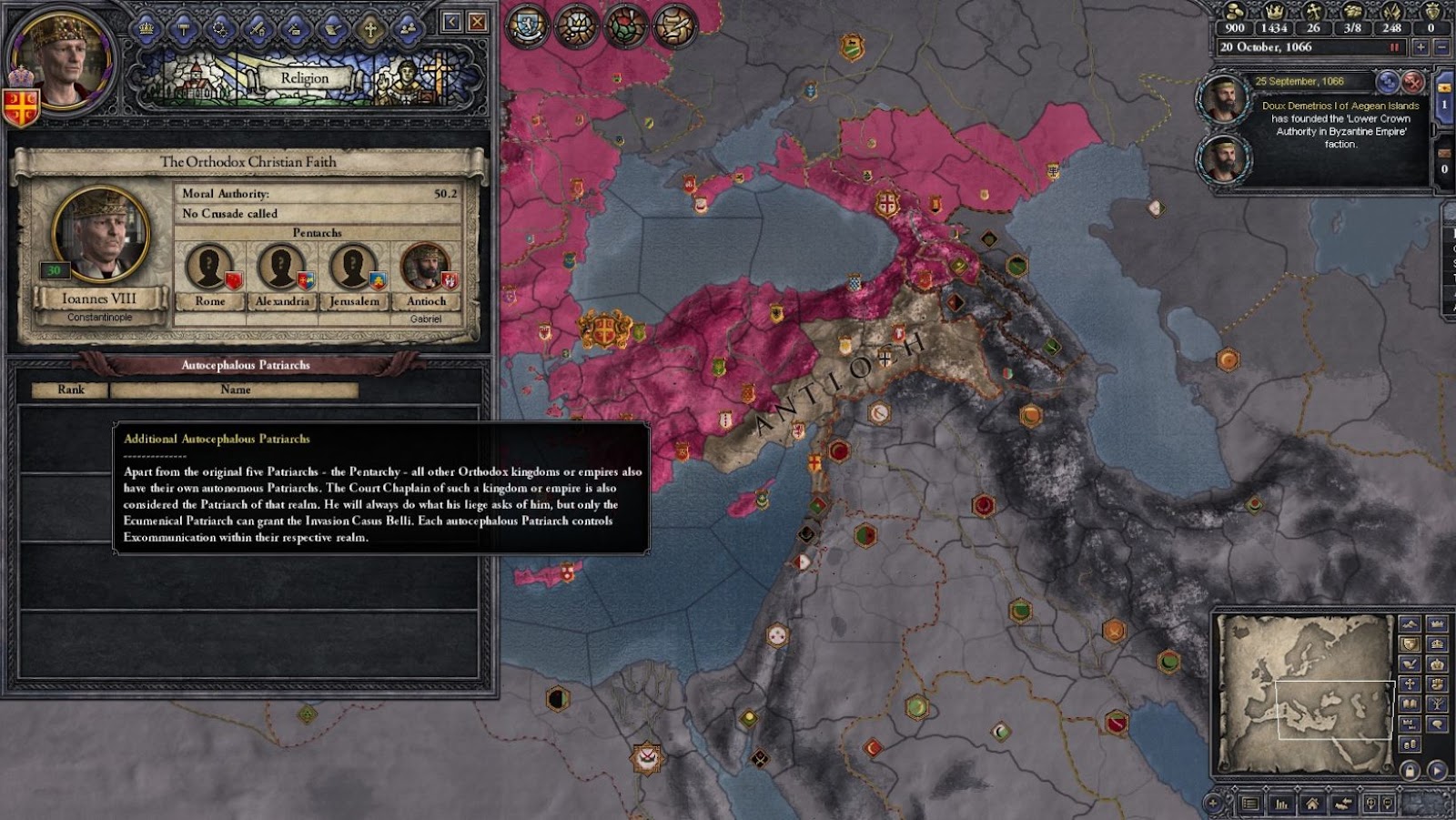
Crusader Kings 2 is a cutthroat strategy game. You must form alliances, manage resources, and expand your realm through diplomacy or force to win. You must also learn feudalism: power flows from the top down, with lords owing loyalty to superiors and vassals to their liege lord.
You will also need to plan for succession. Ensure that your heirs are ready and rivals don’t gain too much influence. Otherwise, a crisis could lead to war or invasion.
Strategic thinking is critical in Crusader Kings 2. It’s full of possibilities for political intrigue, drama, and replayability. For example, I once played as an ambitious noblewoman. I gained influence through strategic marriages and power-building, but ultimately faced revolt and exile due to neglecting allies’ interests.
So, if you’re ready to be a medieval ruler, start your game in Crusader Kings 2. It’s like SimCity, but life-or-death.
Starting Your Game
To start your game with “The Strategy of Crusader Kings 2”, you need to make the right choices to increase your chances of success. This section “Starting Your Game” will help you achieve that by introducing the sub-sections: “Choosing Your Starting Character” to pick the ideal character, “Understanding Your Starting Character’s Traits” to take advantage of their strengths, and “Analyzing Your Starting Character’s Demesne” to plan your strategy wisely.
Choosing Your Starting Character
Start With The Right Character!
Your game’s success depends on your choice of character. So think carefully, to increase your chances of winning!
- Pick a character whose abilities match your game strategy.
- Try multiple characters to see which one fits your style.
- Take note of their strengths, weaknesses, and special features.
- Choose a character that will serve you throughout the game.
- Be aware: the wrong character can set you back, so choose carefully.
Also, remember that a well-rounded team can help you win multiplayer games! So, avoid bias when picking.
Before You Start
Choosing a character is key, but don’t forget about other things!
- Create a unique username for a better gaming experience.
- Learn the plot and objectives before playing.
- Check that you have all the necessary equipment; controllers, headsets, and microphones might be handy for online games.
Call-to-action
Don’t choose characters without thinking. Instead, pick carefully based on this guide’s advice. True winners always think ahead!
Get to know your character like your creepy ex – but this time it’s for a good cause – winning the game!
Understanding Your Starting Character’s Traits
Know Your Char’s Strengths and Weaknesses
To start a game, comprehend your character’s advantages and disadvantages. Assessing your character’s characteristics helps you make smart decisions about various game aspects. Like tactics, alliances and overall gameplay.
- Skills: Knowing your character’s capabilities can help you decide what equipment and weapons to use. As well as how to tackle in-game scenarios.
- Personality: Traits like loyalty, bravery or selfishness influence the storyline. And affect many gameplay choices.
- History: Your character’s past adds depth to the game’s narrative. Affecting the player’s emotional investment in their journey.
It’s vital to learn more about your starting character. Since they can shape a big part of your gameplay. Moreover, immersing yourself in character-building will raise your enthusiasm for the game. Offering more chances to try out distinct playstyles and tactics.
Don’t miss out on this thrilling aspect of gaming! Invest time in understanding your starting character. For an amazing gaming experience.
Choosing a starting character is like picking a prom date – you want someone popular, with good assets. And not related to you.
Analyzing Your Starting Character’s Demesne
Examine the key components of your character’s dominion. This includes:
- Territory
- Resources
- Military Strength
- Political Power
- Cultural Influence
Analyze how they interact and what opportunities/challenges they present. For example, a large military may be helpful for expansion, but it could also strain resources. Every situation is unique. Analyze thoroughly to make informed decisions.
It’s worth noting that dominions may change over time, depending on your character’s success/failure in achieving their goals. Steven Muhlberger, a medieval historian, said “Medieval lords understood that successful government meant controlling not just lands but people.” So don’t expect to conquer the world overnight – start by claiming your bedroom!
Expanding Your Territory
To expand your territory in Crusader Kings 2, choosing the right battles, forming alliances, making deals, and managing your vassals are key. These sub-sections will help you gain more land, protect your dynasty, and become a more powerful ruler.
Choosing Your Battles
When tackling unfamiliar lands, it’s vital to be planned in your approach. Selecting the battles carefully can enhance your success rate and reduce danger. However, that means not every challenge is worth it, so picking the ones that match your dreams and values is critical.
To choose wisely:
- Consider the advantages and dangers of each.
- Assess the necessities such as time, money and energy for every battle.
- Think if you have an edge or are more likely to succeed in other areas.
Deciding battles does not mean dismissing possibilities that do not look helpful – instead, confirm they go with your long-term plan. This involves being open-minded while looking at all the choices accessible.
Exploring new domains is a perpetual process of trial and error, so don’t get disappointed by drawbacks. Instead, be proactive and adapt when needed while concentrating on key objectives.
Friends may come and go, but smart business relationships last forever.
Forming Alliances And Making Deals
Secure your domain and gain an edge with strategic partnerships! Joining forces with industry leaders can open growth possibilities and increase your capabilities. Here’s how:
- Locate potential partners who share the same goals and values.
- Do your homework to guarantee compatibility and success.
- Pen down an agreement, listing out each side’s duties and benefits.
- Keep communicating to maintain a productive bond.
- Periodically assess the partnership.
Beef your business by tapping into new markets or launching new services/products. Understand consumer needs in different locations to tailor offerings to fit their demands. Market research is indispensable for discovering growth opportunities.
Here are some useful strategies:
- Attend networking events to meet potential allies or customers.
- Provide incentives such as trials or discounts to appeal to new market.
- Cross-promote with complementary firms to broaden your reach.
- Build brand recognition via tailored advertising campaigns to generate new prospects.
Managing Your Vassals
Managing vassals requires delegation of tasks, fair treatment, and effective communication. Building trust and providing incentives is key to fostering loyalty. In addition, diplomacy in interactions encourages harmony and discourages conflict.
Identifying each vassal’s strengths and weaknesses develops specific skillsets, resulting in increased efficiency and productivity. Furthermore, adapting and being flexible in different scenarios creates a harmonious relationship which leads to optimal output.
History has shown that poor management of vassal relationships can cause catastrophic chaos, like during the Middle Ages when nobles acted unreasonably towards those under their control, resulting in mutiny and uprisings.
Remember: if you can’t have heirs, at least have hairs – on your chest, that is! If that doesn’t work, adopt!
Keeping Your Dynasty Alive
To keep your dynasty alive in Crusader Kings 2, you must have a solid grasp on marriage, inheriting titles, and managing succession. These sub-sections can help you build a strong family line for generations.
Marriage And Children
Constructing a Family and Upholding the Legacy
Founding a family and rearing kids are necessary to preserve your dynasty. You need to pick a life partner with similar values and aspirations. Also, it’s really important to prepare for the future by discussing money, lifestyle, professional objectives, and raising children.
Raising your kids with great leadership aptitude, proper character, and principles is a must. Showing them family customs, ancestry, and history reinforces their relationship with the family legacy. Stimulating their education, training, and experience gives them the tools they need to keep the dynasty alive.
Supporting your children as they go after their dreams while instilling family values guarantees they will endure while elevating the family name. As a parent or grandparent inspiring new generations of leaders bolsters a strong governance framework while securing the continuity of abundance.
To make certain your legacy lives on past you, pay attention to creating positive connections between generations of family members. Encouraging open communication during disagreements builds understanding and trust within the dynasty.
Don’t miss out on creating a long-lasting legacy for your family. By prioritizing family values over individual interests and nourishing strong relationships between members, you can build a solid foundation for future triumph.
Remember, inheriting titles is like playing a game of musical chairs – just hope your family don’t leave you without a title to sit on.
Inheriting Titles
Maintaining:
Choosing successors to preserve legacies is essential. Communication is vital to make sure they understand their responsibility.
Preserving tradition is an important topic. Records show Louis XIII’s reign established the House of Bourbon as a powerful noble family in France. Even after a King from another family took over, the impact of the House of Bourbon’s legacy is still remembered today.
Keep your dynasty sharp by playing and slaying together when it comes to managing succession.

Is Crusader Kings 2 Fun
Sustaining your legacy calls for navigating the waters of succession. An effective plan and implementation guarantees stability and longevity for future generations. This includes recognizing potential successors, providing training and aligning their goals with the company’s.
Having a reliable advisor or coach during the transition is a huge plus, as it brings a fresh outlook and encourages communication. Documenting policies, procedures and job descriptions is also key, ensuring transparency and continuity.
Developing leadership qualities in successors is essential and goes beyond technical skills. A strategic approach involves implementing a mentoring program, shared decision-making processes, and focusing on soft skills such as conflict resolution, communication, and emotional intelligence.
Succession planning helps manage risks linked to leadership shortages and delivers better business results – increased financial performance, employee retention & improved morale. Investing in the development of talent leads to loyalty, yet neglecting these best practices can be damaging to an organization’s long-term health. So, start early!
Trying to balance religion and politics is like attempting to balance plates on one finger while a tornado is heading your way.
Balancing Religion And Politics
To balance religion and politics in Crusader Kings 2 is crucial. In order to tackle this point, the sub-sections “Dealing with Religious Leaders”, “Managing Your Religious Authority”, and “Interacting with Other Religions” will come in handy.
Dealing With Religious Leaders
When speaking to religious leaders, be sensitive. Respect their beliefs and values. Be open about your political goals. Find the common ground between your policies and their faith. No divine connection is required for successful dealings with religious authorities, just a great PR team!
Managing Your Religious Authority
Religious authority can have a big effect on how politicians share their messages. It’s essential to manage this authority well, to use it positively in politics without causing tension. One way to do this is by understanding the values and beliefs of the people you represent while expressing your views politely.
Leaders need to be careful that their communication doesn’t offend or push away their audience. They should take a more friendly approach to those with different opinions, looking for common ground instead of concentrating on differences. Leaders also need to understand the role of religion in people’s lives, grasp the contexts in which their religious communities work, and build relationships with religious leaders.
To manage religious authority, it’s important to recognize the variety between religions as well as among the different interpretations of each religion. Leaders must avoid making generalizations about individuals or groups based on assumptions. Instead, they should suggest solutions based on facts that apply to everyone.
An example of this is when President Kennedy became president. Many Americans were anxious about a possible clash between his faith (Catholic) and his role as president. But, his skillful handling of his religious authority showed people that he was devoted to secular governance, despite his religious beliefs.
Managing Religious Authority involves insight into the complexities of the connection between religion and politics. Politics has, at times, made positive changes for society without religion. Yet, powerful wisdom can obstruct progress. This is the key to managing these two complicated areas – showing empathy and mutual understanding between them. Interfaith dialogue is like a game of chess; it takes strategy, patience, and a willingness to give up a few pieces.
Interacting with Other Religions
Religious Coexistence in Politics is a great challenge. It’s a delicate balance between theological beliefs and political pursuits. Being tolerant in Interfaith Dialogue can lead to harmony. Respectful of other perspectives, learn from their experiences and share your own.
When discussing theology with people of different faiths, know the nuances of each religion’s doctrines and protocols. Listen with an Open Mind to find common ground. Avoid misunderstandings that could lead to conflict.
Realize that One Size Fits All does not apply when interacting with people from various religions. Don’t generalize, embrace diversity, and Celebrate Differences.
In Tanzania, Christians and Muslims had always interacted well until different interpretations of Islam caused hostility. This led to riots with deaths, injuries and displacement. However, interfaith dialogues identified sensitive issues affecting both cultures. This positively challenged individuals’ opinions, ending the violence in the region. Mastering the art of warfare is like playing chess – except with bombs instead of pawns.
Mastering The Arts of Warfare
To master the arts of warfare in Crusader Kings 2, you need to focus on building your army, conquering territory, and handling sieges. These sub-sections will help you get closer to your ultimate goal of achieving victory in the game. By building a strong army, expanding your territories, and protecting your land, you’ll gain a competitive edge over your opponents.
Building Your Army
Building a powerful army is essential for warfare. To master the art of crafting your military, proper planning, resources and personnel management is needed. Here are four key factors to help build a strong army:
- Selection Process: Get qualified people with the skills and qualities to do tasks and adapt in changing situations.
- Training Programs: Design training to develop physical endurance, mental toughness and tactical combat skills for the soldiers.
- Logistics Management: Manage transport, supplies, equipment and maintain activities that help operations on the ground.
- Morale Boosters: Create morale-boosting activities like team building, leadership programs, awards and incentives to impact soldiers’ attitude.
Engage your troops regularly and recognize their work. Remind them of their role in history. Since ancient kingdoms, assembling an army has been important. In our war-torn world, effective military power equals stability. But don’t forget to bribe your inner demons with chocolate!
Conquering Territory
“Territorial Domination” needs strategic planning and tactics. Here’s a 5-step guide:
- Analyze target’s strengths, weaknesses, and resources. Learn their tactics and methods.
- Devise an offensive plan using your strengths and enemy’s weaknesses.
- Infiltrate using espionage techniques and guerilla warfare.
- Choose leaders with superior leadership skills and knowledge of terrain.
- Establish a strong administration and deliver welfare to win public support.
Beyond conquest, engage locals with their culture and establish norms. Alexander The Great was undefeated until his death at 32. When it comes to sieges, patience is key. Wait for the enemy to run out of food – or hope.
Handling Sieges
Handling Besiegement – A 6-Step Guide
- Assess the enemy. Analyze their strengths & weaknesses.
- Formulate defense & offense strategies. Plan for scarcity.
- Form a communication plan. Keep it secure.
- Be adaptive. React to enemy changes.
- Post-siege assessment. Learn from feedback.
- Diversionary measures. Traps & decoys.
- Reinforcements. Disrupt enemy plans.
Remember: A well-fed army is a happy one. Raid the enemy’s stash!
Developing Your Economy
To maximize your in-game resources in the popular strategy game Crusader Kings 2, developing your economy is essential. Building and upgrading buildings, managing your income and expenses, and trading and raiding are the top ways to do this. This section will explore each tactic, highlighting how they can be used to enhance your in-game wealth.
Building And Upgrading Buildings
Enhancing an economy needs investment across different sectors, like construction. Constructing and developing infrastructure can bring about a massive effect on the economic growth.
- Constructing new buildings provides job openings and makes money for the public.
- Upgrading existing structures with modern features improves their efficiency and safety.
- Good infrastructure attracts investors and grows businesses.
- A better transportation system makes it simpler to move goods and people, and lowers transportation costs while boosting productivity.
- State-of-the-art educational buildings draw students, researchers and businesses to the area.
It must be kept in mind to prioritize sustainability over appearance to prevent financial issues.
Investing in real estate or public properties helps economic stability and technological advances. Nevertheless, it is essential to make sure government transparency concerning the projects’ funding sources.
McKinsey & Co. conducted a study and discovered that developing countries that invested in infrastructure had a three percent yearly rise in gross domestic product (GDP). Investing in infrastructure projects has been beneficial at all GDP levels.
A dependable infrastructure adds to economic development and social progress and welfare through superior access to healthcare, education, and most importantly, jobs. Managing money is like a game of Jenga – one wrong move and it all comes tumbling down.

Managing Your Income And Expenses
Efficiently managing your finances is key for a thriving economy. Try these 3 tips for smart money management:
- Create a budget plan with specific categories
- Track your spending, use tech if you can
- Reduce debts and credit cards; save for emergencies
Plus, consider investing in long-term assets like property or mutual funds. This income will add up and benefit your finances.
Did you know? Only 24% of millennials possess basic financial literacy skills, according to the National Financial Educators Council (NFEC).
When it comes to money, more is always better…unless you’re trying to squeeze it all in your seat!
Trading And Raiding
Peaceful trading and violent raiding – two ways of getting resources that can either build or break an economy. Trading involves cultures exchanging goods and services, while raiding is a violent approach of taking them. Some even prefer raiding over trading. Trading networks have brought people together and increased diversity. Economies thrive when nations form peaceful alliances that promote trade; however, too much raiding can cause neighbors to lose sustenance.
Fun Fact: Global GDP increased by a whopping $60 trillion between 2000-2018!
If your economy is tanking, it’s time to get serious with budgeting!
Dealing With Emergencies
To deal with emergencies while playing Crusader Kings 2, you must know what to do when faced with revolts, assassination attempts, and external threats. Handling these situations can be difficult, but with proper strategy, you can survive and even thrive in these difficult times.
Dealing With Revolts
In the event of mass unrest, proper management is key to protect individuals and property. Follow this step-by-step guide for effective handling of such scenarios.
- Analyze: Quickly figure out the scope and nature of the revolt.
- Get Help: Contact police and other relevant bodies for backup.
- Talk: Use language that shows understanding of the rioters’ grievances and concerns. No debating or argumentative tactics.
- Plan: Develop a strategy based on what you know, aiming to meet goals while minimizing risk.
- Execute: Give clear instructions, and use agility, teamwork, communication and thoroughness to ensure success.
- Support: After resolution, provide counseling services to those affected.
Always analyze each scenario as different solutions are needed based on context and severity.
Pro tip: Make sure training is updated regularly, preparing staff for sudden disturbances & hazards that come with large crowds or events.
When someone’s after you, duck and cover – and hope they’re a bad shot!
Handling Assassination Attempts
Facing physical violence is scary. To stay safe, create a plan. Analyze risks and decide the best action. Hire security, change routines, and tell the police. During an attack, stay calm and alert. Make safe spaces and know escape routes. Tell trusted contacts about the danger.
Assassination attempts are rare, but preparing can bring peace of mind. Remember Senator Robert F. Kennedy’s assassination in 1968. Even high-level people can be targeted. Preparing for emergencies is key for everyone. Who needs a panic room when you have a mother-in-law arriving unannounced?
Responding to External Threats
Danger needs urgent action. Stay alert and plan ahead!
- Be aware of surroundings and have a way to communicate quickly.
- Have a plan for different scenarios.
- Be ready to adjust in case of an emergency.
Regular training helps with this. It is important for reducing risk!












